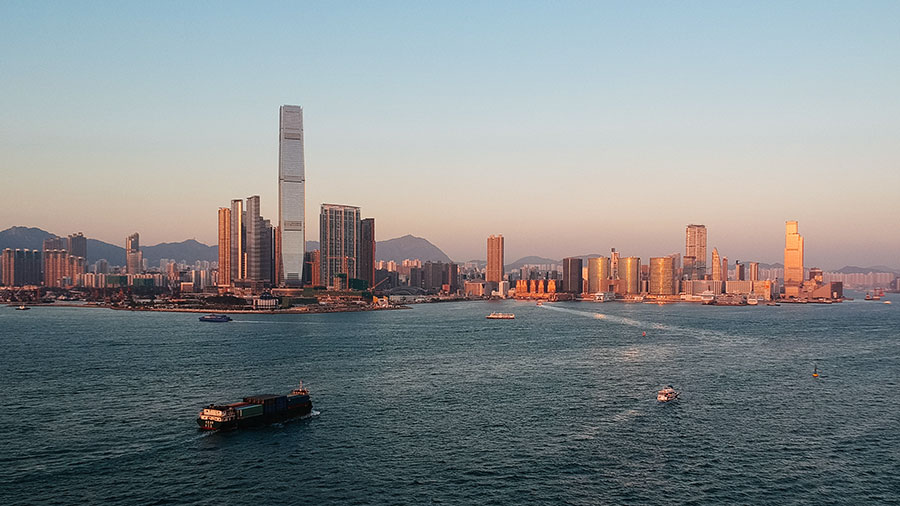Geographical proximity to China and the Greater Bay Area
As a Special Administrative Region (SAR) of China, Hong Kong enjoys a highly active and cooperative business relationship with the mainland. It is both Hong Kong's leading conduit for foreign investment and its primary offshore capital-raising center. As one of the world’s largest IPO markets, Hong Kong is expected to attract more Chinese companies to list amid tensions between the US and China.
Hong Kong’s geographic position enables businesses to easily tap into the various opportunities in the Guangdong-Hong Kong-Macao Greater Bay Area (GBA) and the mainland market. The GBA – now the world's largest and most populated bay area in the world – will strengthen Hong Kong’s geographical and economic ties with the mainland.
Hong Kong has been actively seeking to expand its Free Trade Agreement (FTA) network to secure favorable conditions for its goods and services to enter the mainland and international markets.
Hong Kong has signed eight FTAs:
- The Mainland of China (June 2003);
- New Zealand (March 2010);
- The Member States of the European Free Trade Association (EFTA) (June 2011);
- Chile (September 2012);
- Macau (October 2017);
- The Association of Southeast Asian Nations (ASEAN) (November 2017);
- Georgia (June 2018);
- Australia (March 2019); and
- Peru (November 2024).
Hong Kong is currently negotiating investment agreements with Saudi Arabia, Bangladesh, Egypt, and Peru. Additionally, efforts are underway for Hong Kong's early accession to the Regional Comprehensive Economic Partnership (RCEP).
Effective from March 1, 2025, the Second Agreement Concerning Amendment to the Mainland and Hong Kong Closer Economic Partnership Arrangement (CEPA) Agreement on Trade in Services introduces new liberalization measures across several service sectors. These measures aim to enhance market access for Hong Kong businesses in the Chinese Mainland.
The recent CEPA amendments allow Hong Kong businesses to adopt local laws and arbitration services for their operations in the Chinese Mainland, providing greater legal certainty and flexibility.
Double Taxation Avoidance Agreements
Hong Kong has signed comprehensive DTAs with 52 jurisdictions and is negotiating agreements with 19 others. The DTAs specify the tax rates for dividends, interest, royalties, and technical fees these countries can charge Hong Kong residents. The methods for eliminating double taxation are outlined in each DTA or the country's domestic law, with the tax credit method being the most common.
Hong Kong's Double Taxation Agreement (DTA) network provides a mechanism to mitigate the challenge of double taxation faced by global investors. Hong Kong follows a territoriality-based taxation system, taxing only income/ profit sourced in Hong Kong, thus avoiding double taxation for its residents.
Additionally, Hong Kong offers unilateral tax credit relief to its residents who operate businesses in other countries, ensuring they avoid issues with double taxation.
Further, the Mainland and Hong Kong Closer Economic Partnership Agreement (CEPA) allows Hong Kong products and services easier access to the vast mainland market.
The CEPA goes beyond China’s WTO commitments, eliminating tariffs and allowing earlier or preferential access to some service sectors. Overseas companies can also benefit from CEPA. For trade-in goods, foreign investors can set up production lines in Hong Kong to produce goods that meet the CEPA rules of origin (ROO) requirements. For trade-in services, companies incorporated in Hong Kong by foreign investors can utilize CEPA as long as they satisfy the eligibility criteria of a “Hong Kong Service Supplier.”
Financial sector-wise, Hong Kong and the Chinese Mainland have made remarkable progress in opening new channels to enhance their financial connectivity, including the establishment of Shanghai-Hong Kong Stock Connect, Shenzhen-Hong Kong Stock Connect and Bond Connect, Mainland-Hong Kong Mutual Recognition of Funds arrangement, and the most recent two-way cross-boundary Wealth Management Connect in the GBA. Hong Kong’s status as an international financial hub is expected to be further strengthened under the GBA development plan.
Simple and low tax regime
Hong Kong offers one of the most tax-friendly systems in the world. It imposes only three kinds of direct taxes – profits tax (for incorporated bodies), salaries tax (for personal income), and property tax (for income sources from Hong Kong property). There are also generous allowances and deductions to reduce the burden on taxpayers.
Hong Kong has no turnover taxes, including sales tax or value-added tax, making it a favorable location for profit shifting and conducting re-invoicing.
Unlike other jurisdictions, the city adopts a territorial basis of taxation – only income sources from Hong Kong are taxable. There is no distinction made between residents and non-residents. Therefore, a resident of Hong Kong can receive profits from abroad without incurring tax in Hong Kong, even if they are remitted to Hong Kong.
One of the world’s freest economies
Hong Kong’s economic system is defined as a free-market economy characterized by minimum intervention from the government, low taxation, free port trade, and a highly internationalized and modernized financial market.
As one of the most Laissez-faire economies in the world, the government’s policy is strictly non-interventionist. The absence of exchange controls, corruption-free government, and free flow of information, capital, and talents has enabled Hong Kong to maintain a free and efficient business environment for business activities and commerce.
Further, Hong Kong is well-perceived for its “free port” and straightforward customs clearing. The city has no tariffs on imported goods and quotas, no dumping tax laws, and applies excise duties to only four commodities – hard alcohol, tobacco, oil, and methyl alcohol.
Government support for businesses
Hong Kong offers robust government support for businesses, fostering a favorable entrepreneurship and economic growth environment.
The government actively promotes business-friendly policies, including simplified business registration procedures, easy access to government services through the online platform "GovHK," and streamlined visa arrangements for skilled professionals.
Keeping that in mind, foreign investors have several options to carry out business through multiple business vehicles, including:
- A company incorporated in Hong Kong;
- A branch office of the foreign corporation;
- A representative office;
- Sole proprietorship; and
- Partnership.
While some options are more commonly adopted than others, investors are advised to choose the most appropriate business structure based on the pros and cons of each option.
Further, the government agency InvestHK also provides one-stop support services for companies looking to establish or expand their presence in Hong Kong. It offers guidance on various aspects of business development, including incorporation, taxation, and regulations.
Developed financial services landscape
Hong Kong has established itself as one of the world's leading international financial centers. Businesses in this sector can leverage several factors:
- Prime Location: Hong Kong's strategic location has made it a go-to destination for businesses looking to tap into the vast markets of the Chinese Mainland and the broader Asia-Pacific region. It serves as a crucial gateway to China's booming economy.
- Robust Financial Infrastructure: Hong Kong boasts a highly developed and sophisticated financial infrastructure. It offers premium banking, insurance, and asset management services. Moreover, it has a strong regulatory framework and legal system that supports transparency and stability.
- Currency Stability: The Hong Kong Dollar (HK$) is known for its stability and can be freely converted. This stability is maintained through a linked exchange rate system with the U.S. dollar.
- Strong financial regulations: The city has a reputation for prudent regulationsthat adhere to international standards. Oversight is managed by institutions like the Securities and Futures Commission (SFC) and the Hong Kong Monetary Authority (HKMA).
- Global connectivity: Hong Kong is well-connected to international markets and is a central hub for foreign exchange trading, trade finance, and cross-border investment between China and the rest of the world.
- Financial Innovation: Hong Kong embraces financial technology (FinTech) and innovation. Initiatives like virtual banks and blockchain applications are actively promoted to adapt to industry changes.
- Belt and Road Initiative (BRI): Hong Kong plays a crucial role in China's Belt and Road Initiative (BRI) by serving as a hub for financing and advising on projects spanning Asia and beyond.
- Wealth Management: The city has witnessed significant growth in private wealth management services, catering to high-net-worth individuals and families.
Hong Kong's status as a leading international financial center results from its strategic location, strong financial foundation, stable currency, and unwavering commitment to open markets. These elements, coupled with effective regulation and a culture of innovation, continue to draw businesses and investors worldwide.
Why invest in Hong Kong
A highly dynamic city that serves as a gateway to the Chinese Mainland and Asia, Hong Kong is the ideal place for business in Asia. Hong Kong’s business-friendly environment, low taxes, rule of law, free economy, modern infrastructure, I&T capabilities, and robust intellectual property protection will all help businesses and individuals in this most competitive and international city.
Hong Kong is a hotbed for companies looking to leverage market advantages such as:
- An open, fair, and efficient business environment
- Competitive tax regime
- Excellent legal and dispute resolution services under the rule of law
- Close proximity to markets in Asia, including the Chinese Mainland
- Leading global financial services center
- Network of international free trade and tax agreements
- World-class infrastructure with sophisticated support services
- Highly skilled and multicultural talent pool and a liberal Immigration policy
Investing in Hong Kong offers a unique blend of stability, access, innovation, and opportunity in the heart of Asia. It continues to be a preferred destination for both seasoned and emerging investors seeking a prosperous and dynamic business environment.












